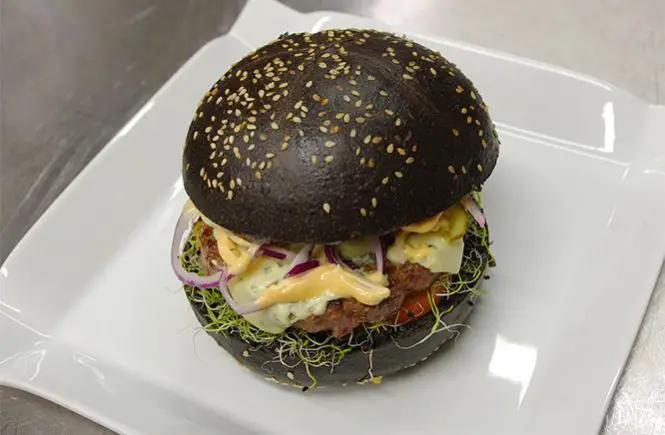Distinctive in color, black burger buns have captured the attention of both fast-food chains and upscale burger joints. Their captivating hue is not just visually appealing but also serves as a refreshing break from the usual bread buns.
In today’s article, we’re setting our sights on these black buns – their composition, creation process, nutritional aspects, and their standing on the health meter.
Inside the Black Bun
So, what goes into making these buns dark? Generally, black burger buns incorporate regular bread-making ingredients combined with a color-adding component to achieve that deep shade. Here’s a glimpse at their usual composition:
- Base: Often, bread or all-purpose flour forms the foundation.
- Yeast: Gives the dough its rise, resulting in a light, airy bun.
- Sugar: Besides lending a hint of sweetness, it fuels the yeast.
- Salt: Balances the sugar’s sweetness and enhances the overall flavor.
- Eggs & Butter: They give depth in flavor and combine the ingredients.
- Water: It binds everything together.
The black tint primarily comes from either activated charcoal or squid ink. While activated charcoal, a natural food-grade element, is popular in health supplements for its absorption properties, squid ink offers a subtle, sea-salt taste, often found in Mediterranean and Asian dishes.
Crafting the Black Bun
The creation of black burger buns mirrors the process of its regular counterparts but with the addition of the coloring agents:
- Form the Dough: This involves combining all ingredients until a supple dough is achieved.
- Infuse Color: The chosen color agent, be it squid ink or activated charcoal, is then added.
- Knead & Proof: Once kneaded to perfection, the dough undergoes a rise, almost doubling in size.
- Mold & Bake: After rising, it’s molded into bun shapes and baked to perfection.
Nutrition in the Spotlight
Using Karaway Charcoal Burger Buns as an example:
- Per 100g: 308 Kcal, Fat 7.9g, Carbs 51.4g, Fiber 2g, Protein 8.6g, Salt 0.83g.
- Per 70g bun (approx): 215.6 Kcal, Fat 5.53g, Carbs 35.98g, Fiber 1.4g, Protein 6.02g, Salt 0.58g.
For comparison, a standard brioche bun from M&S has somewhat similar values.
Black Bun – Healthy or Hype?
At face value, black buns are nutritionally on par with their regular peers. However, the added coloring agents, activated charcoal or squid ink, don’t necessarily elevate their health quotient. Activated charcoal, while famed for detox properties, lacks substantial scientific backing. As for squid ink, its nutritional values in buns may be negligible.
However, there are considerations. Activated charcoal might interfere with certain medications, and excess consumption might lead to digestive issues. Squid ink, while generally edible, might trigger allergies in a few.
Procuring These Buns
If intrigued, here’s where you might find them:
- Local Bakeries: Upscale or specialty bakeries might stock these.
- Restaurants: Some burger specialists might offer them.
- Online: Various online stores, including Ocado, Yumbles, and Amazon, list them.
Or, for a personalized touch, you could make them at home. Online recipes, like the ones on ‘becs-table.com.au’ or ‘chainbaker.com’, can guide you.
Wrapping Up
Black burger buns, with their distinctive look, have undeniably made a mark. While their nutritional content aligns closely with standard buns, they do offer a change in aesthetics and flavor. For those keen to experiment, these buns can be a novel addition. Just be aware of any associated risks and enjoy them as part of a diverse diet.

